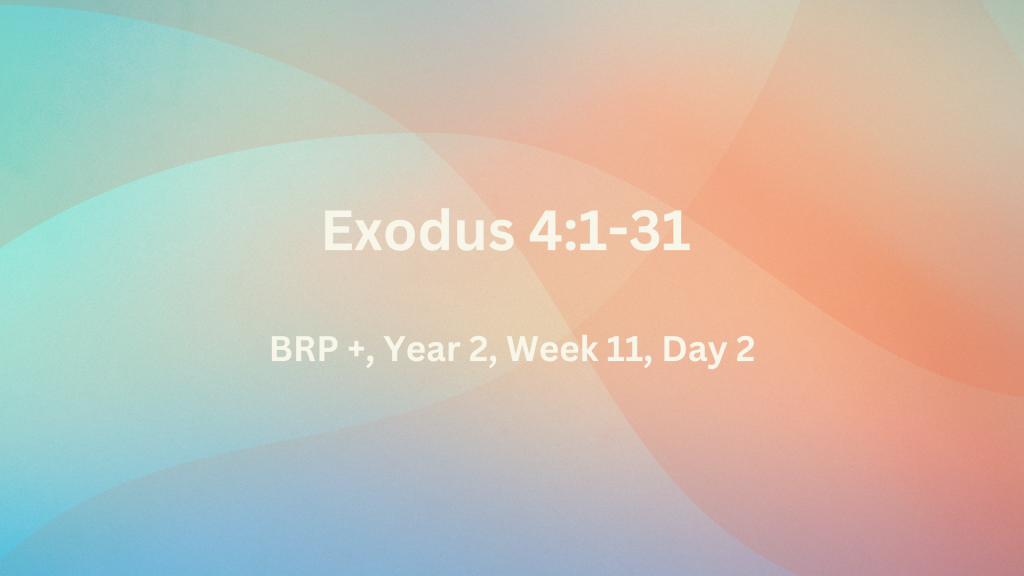Exodus 4:1-31
Q.1. How did God address Moses’s fear of rejection? What were his miraculous powers to prove? How did God answer his other objections? What would his new relationship be to Aaron? – (Ex.4:1-17)
Moses had good reason to fear that his attempts to rescue his people would be rejected, as they were forty years earlier (Ex.4:1 c.f. Ex.2:13-14). God therefore gave him some special signs to confirm his divine call for him to lead them: (i) God turned his staff into a serpent. It was so realistic that Moses fled from it (Ex.4:2-4). (ii) He made the hand of Moses leprous, and then restored it again (Ex.4:6-8). (iii) He gave him the ability to turn water from the Nile into blood (Ex.4:9). All these were given – that they may believe that the Lord, the God of their fathers, the God of Abraham, the God of Isaac, and the God of Jacob, has appeared to you (Ex.4:5). Moses then argued with God about his lack of eloquence, to which God replied – 11 … “Who has made man’s mouth? Or who makes him mute or deaf, or seeing or blind? Is it not I, the Lord? 12 Now then go, and I, even I, will be with your mouth, and teach you what you are to say.” (Ex.4:11-12). God was reminding Moses that He knew what He was doing. However, Moses still resisted and asked that someone other than him could take the message to the Hebrews (Ex.4:13). To this, God responded with anger, because of his stubbornness, and agreed to let him work in tandem with his brother Aaron (Ex.4:14). Far from changing His call, God commanded – 15 You are to speak to him and put the words in his mouth; and I, even I, will be with your mouth and his mouth, and I will teach you what you are to do. 16 Moreover, he shall speak for you to the people; and he will be as a mouth for you, and you will be as God to him (Ex.4:15-16). Moses was to direct his older brother in what to say. The call of Moses underscored God’s tendency to choose the most unlikely candidates to serve Him, thus highlighting His glory and grace (c.f. 1 Cor.1:18-31).
Q.2. How did Moses prepare for his journey? When did God next speak to him? Would the mission of Moses meet with success? What message was Moses to give Pharaoh? – (Ex.4:18-23)
Moses had served Jethro for forty years after fleeing Pharaoh. Though God had called him and assured him he would be safe, he still sought his father-in-law’s blessing before leaving (Ex.4:18-19). It was when he took his wife and sons on the journey, that God gave him further details about his difficult mission – … When you go back to Egypt see that you perform before Pharaoh all the wonders which I have put in your power; but I will harden his heart so that he will not let the people go (Ex.4:21). However, God told Moses what he should say to Pharaoh – 22 … Thus says the Lord, "Israel is My son, My firstborn. 23 So I said to you,Let My son go that he may serve Me’; but you have refused to let him go. Behold, I will kill your son, your firstborn.” (Ex.4:22-23). This would get the undivided attention of Pharaoh and would ensure that there would be a confrontation that would enable God to reveal His power to His people, the Egyptians, and the surrounding nations.
Q.3. Why would God take the drastic step of killing Moses? Where did Aaron meet Moses? How did the meeting go? What was their meeting like with the elders of Israel? How did they respond? – (Ex.4:24-31)
There was a serious problem with the obedience of Moses, which had to be rectified so that he would be fit to serve. It seems that Zipporah was not happy to have her son circumcised – the sign of God’s covenant people. Moses was not only to be God’s mouthpiece to His people, but also a model of what he taught. Amazingly, it is recorded – 24 Now it came about at the lodging place on the way that the Lord met him and sought to put him to death. 25 Then Zipporah took a flint and cut off her son’s foreskin and threw it at Moses’ feet, and she said, “You are indeed a bridegroom of blood to me.” 26 So He let him alone. The rescue mission would have failed before it began if Moses had not persuaded Zipporah to obey. Moses then proceeded to the Mountain of God where he met up with Aaron (Ex.4:27). The initial response by Israel to the dramatic signs was belief. We read – So the people believed; and when they heard that the Lord was concerned about the sons of Israel and that He had seen their affliction, then they bowed low and worshiped (Ex.4:31). However, increased trials would soon test the reality of the people’s faith.

